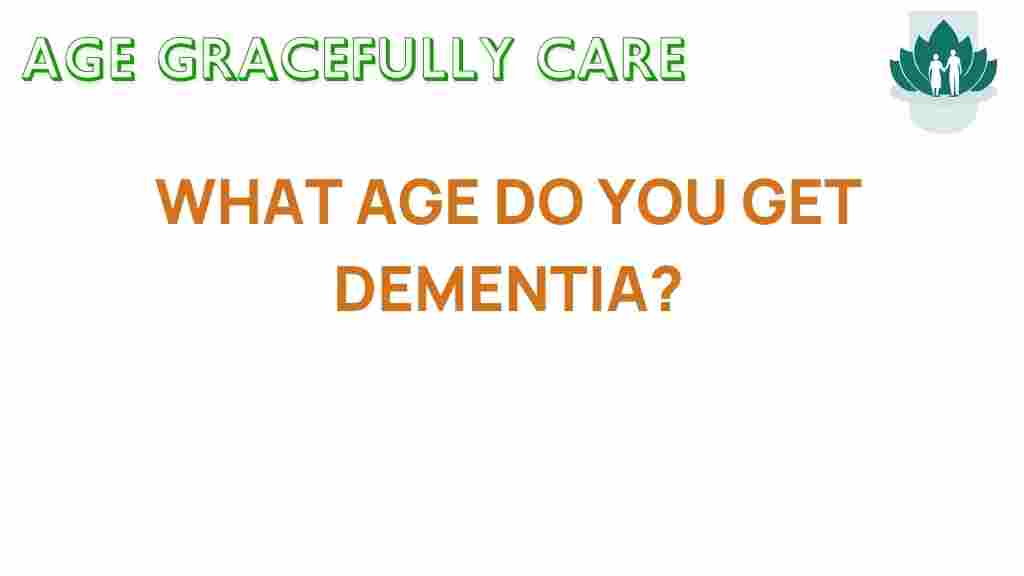Unraveling the Mystery: At What Age Does Dementia Begin?
Dementia is often shrouded in uncertainty and fear, especially when it comes to understanding its age of onset. As individuals age, concerns about cognitive decline and memory loss become more prevalent, making it essential to explore the early signs and risk factors associated with dementia. In this article, we will delve into the age at which dementia typically begins, the different types of dementia, particularly Alzheimer’s disease, and how to maintain brain health as we grow older.
The Age of Onset of Dementia
Dementia is not a single disease but rather a term that encompasses various neurological disorders characterized by cognitive decline that interferes with daily life. The age of onset for dementia can vary significantly based on several factors, including genetics, lifestyle, and overall health.
Generally, dementia is more common in older adults, with the risk increasing significantly after the age of 65. However, early-onset dementia can occur in individuals in their 40s or 50s, which can be particularly challenging for families and caregivers.
Understanding Different Types of Dementia
While Alzheimer’s disease is the most common form of dementia, other types include:
- Vascular dementia: Often caused by strokes or other issues that affect blood flow to the brain.
- Lewy body dementia: Associated with abnormal protein deposits in the brain.
- Frontotemporal dementia: Primarily affects the frontal and temporal lobes of the brain, impacting personality and behavior.
Each type can present differently, but all share common symptoms like memory loss and cognitive decline, typically worsening over time.
Risk Factors for Dementia
Understanding the risk factors for dementia is crucial for early detection and intervention. Some of the key risk factors include:
- Aging: Age is the most significant risk factor for dementia. The likelihood of developing the condition doubles every five years after the age of 65.
- Genetics: Family history can increase the risk, particularly for Alzheimer’s disease.
- Heart health: Conditions like high blood pressure, diabetes, and high cholesterol can impact brain health.
- Lifestyle choices: Smoking, excessive alcohol consumption, and sedentary behavior can increase the risk of cognitive decline.
- Education and cognitive engagement: Lower levels of education and lack of mental stimulation may contribute to a higher risk.
Early Signs of Dementia
Recognizing the early signs of dementia can lead to more effective management of the disease. Common symptoms include:
- Memory loss that disrupts daily life
- Difficulty planning or solving problems
- Confusion with time or place
- Challenges in understanding visual images and spatial relationships
- New problems with words in speaking or writing
If you or a loved one experiences these symptoms, it is essential to consult a healthcare professional for evaluation.
Maintaining Brain Health as We Age
While aging is an unavoidable risk factor for dementia, there are steps one can take to help maintain brain health:
- Stay mentally active: Engage in puzzles, reading, or learning new skills.
- Physical exercise: Regular physical activity boosts blood flow to the brain.
- Healthy diet: Emphasize fruits, vegetables, whole grains, and healthy fats to support brain health.
- Social engagement: Staying connected with friends and family can help reduce the risk of cognitive decline.
- Manage chronic conditions: Control blood pressure, cholesterol, and diabetes through lifestyle changes and medication.
Step-by-Step Process for Assessing Brain Health
To effectively assess and maintain brain health, consider following these steps:
- Regular Check-ups: Schedule annual health check-ups to monitor blood pressure, cholesterol, and other vital health indicators.
- Cognitive Assessments: Discuss cognitive assessments with your doctor if you notice memory changes.
- Adopt a Healthy Lifestyle: Implement a diet and exercise routine aimed at improving overall well-being.
- Stay Informed: Keep up with research and developments in dementia to understand better how to protect brain health.
- Seek Support: Join support groups or networks for additional resources and guidance.
Troubleshooting Tips for Concerned Caregivers
If you’re caring for someone showing signs of cognitive decline, here are some troubleshooting tips:
- Stay Calm: Approaching the situation with patience and understanding can ease anxiety for both you and the individual.
- Document Changes: Keep a journal of observed cognitive changes to discuss with healthcare providers.
- Encourage Routine: Establishing a daily routine can help reduce confusion for those experiencing memory loss.
- Maintain a Safe Environment: Ensure the living space is safe and familiar to minimize risks and confusion.
- Explore Professional Help: Consider professional caregiving services or respite care if needed.
Future Research and Developments
The field of dementia research is rapidly evolving, with ongoing studies aimed at understanding the causes of cognitive decline and developing effective interventions. Promising areas of research include:
- Genetic Studies: Investigating the genetic predispositions for Alzheimer’s and other forms of dementia.
- Neuroimaging Technologies: Advancements in imaging may help detect early changes in the brain associated with dementia.
- Preventive Strategies: Exploring lifestyle modifications and medications that might delay or prevent the onset of dementia.
For more information on the latest research in dementia, visit the Alzheimer’s Association.
Conclusion
Understanding at what age dementia begins and the factors contributing to cognitive decline is vital for promoting brain health. While aging is a significant risk factor, engaging in healthy lifestyle choices can help mitigate the risk of dementia. Early detection is crucial, and recognizing the early signs can lead to better management of the condition. As research continues to unfold, staying informed and proactive can empower individuals and families to navigate the complexities of dementia more effectively.
For further resources and support, consider visiting National Institute on Aging.
By unraveling the mystery surrounding dementia, we can foster a more informed and supportive community for those affected by this challenging condition.
This article is in the category Health and created by AgeGracefullyCare Team
